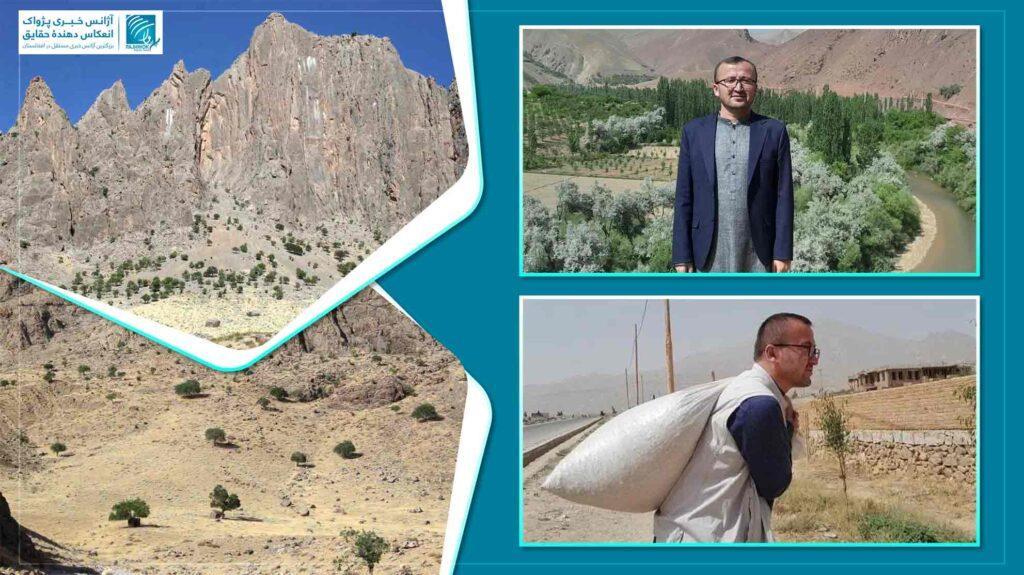
'Green Future' Campaign: Daikundi Activist's Efforts To Restore Forests, Pastures
NEILI (Pajhwok): Climate change and years of neglect has stripped the mountains of central Daikundi province of their native forests and pastures, leaving them barren and lifeless. Now, a young environmental activist is striving to bring a“Green Future” back to the hills.
Habibullah Najafizada, a 34-year-old activist from Ashtarlai district, began his work in environmental protection on April 10, 2025. His first step was raising awareness about the harmful effects of plastic use in public spaces.
For the past two months, under the banner of his“Green Future” campaign, he has been planting wild almond seeds and other native trees across the hills and mountains of the province. He stresses that this is not just a personal initiative but a locally adapted, science-based project launched in consultation with agricultural and environmental experts.
Najafizada believes the destruction of mountain forests threatens not only natural beauty but also people's livelihoods.
“I am one of those directly affected by environmental degradation,” he said.“My father's and neighbours' lands lay in a valley once covered with forests, pastures and farmland. But after the trees were felled and grazing grounds destroyed, severe floods swept through, damaging the land and leaving the mountains exposed to erosion. I witnessed this devastation clearly from my school days.”
A political science graduate, Najafizada deepened his understanding of the problem while travelling across Afghanistan, including Helmand, Kandahar, Faryab, Jawzjan, Ghor, Bamyan, Baghlan and Herat provinces.
“Everywhere, I saw barren mountains without grass or water, forests destroyed and dust threatening people's lives. Climate change has affected all aspects of life, but each of us suffers separately through poverty, drought and displacement,” he explained.
These experiences inspired him to launch the“Green Future” campaign and other initiatives to create green cover and restore a healthy environment.
He insists the time has come for people to unite against this common challenge. Restoring mountain forests and pastures, reducing plastic waste, managing water resources properly and promoting renewable energy, he says, are collective responsibilities.
Through his campaign, he is encouraging communities to plant both fruit-bearing and non-fruit-bearing mountain trees. His aim is to restore forests and pastures, preserve biodiversity, prevent the extinction of native trees, and reduce soil erosion and natural disasters.
Daikundi's soil, he says, is well-suited for wild almond, fig, juniper, erghi, arghawan, salbi and other hardy local species that require no irrigation. Some of these trees still survive in limited numbers.
Expanding beyond Daikundi
Najafizada began his campaign in the Kiso area of Kaiti district, purchasing seeds of mountain trees to plant them across the hills.
The effort has since spread beyond Daikundi to Uruzgan, Ghazni, Maidan Wardak, Parwan, Bamyan and Ghor provinces due to similarities in soil and climate.
“Our method is simple,” he explained.“I and a group of volunteers coordinate through the Green Circle centres in districts and provinces. Seeds are exchanged voluntarily and distributed to the public. For example, if someone buys wild almond seeds and hands them to us, we distribute them across seven provinces. Others cover the transport costs. Volunteers procure seeds wherever they are available and deliver them free of charge to their destinations.”
Najafizada initially funded the campaign himself, purchasing about 8.5 kilograms of wild almond seeds, but public enthusiasm and support have since rejuvenated the effort.
He frequently shares updates on social media, providing information on seed collection and tree planting.
Linking environment & livelihoods
For residents of Daikundi, restoring forests is not only an environmental necessity but also an economic one. This mountainous province relies heavily on agriculture and livestock. The destruction of pastures and wild plants has reduced livestock farming and made it harder to feed animals.
“If forests and pastures are restored, not only will the local economy improve, but villages will remain more stable and migration to the cities will decrease,” Najafizada explained.
He added that the loss of forests has weakened rural economies, limiting people's ability to rear livestock and produce dairy. Green cover, he noted, also encourages the return of wildlife.
Najafizada's campaign has grown from a small local movement into an inspiring initiative. He wants people to believe that positive change begins with small, individual efforts.
“If we do not revive native trees today, tomorrow we will face desertification and water crises. Greening the mountains is not just a voluntary effort but a vital necessity for Afghanistan's survival,” he stressed.
Reception of the“Green Future” campaign
Meysam Haidari, an agriculture graduate from Daikundi, welcomed the drive, calling wild mountain trees the only sustainable way to re-green the mountains.
He explained that these trees prevent soil erosion and dust storms and can also become valuable sources of income through their fruit. Among them, wild almond is the most resilient, thriving in poor, dry soils without irrigation and bearing fruit after just a few years.
“If we don't revive native trees today, in the future we will face desertification, soil infertility, and water shortages. Greening the mountains is not merely voluntary-it is essential for sustainable development and Afghanistan's survival,” he added.
Other volunteers in the campaign echoed this message, stressing that restoring mountain forests and pastures is fundamental to achieving a healthy environment and sustainable life.
Arash, one of the volunteers who promotes the campaign on social media, said:“We must all take part. This effort not only strengthens the local economy but also secures the future of our environment.”
Value of wild almond
One tree at the heart of the campaign is the wild almond, known for its resilience to drought and poor soil. It grows in limited numbers in areas such as Wars village of Daikundi's Shahristan district.
Arash, a resident of Wars, highlighted its importance:“Wild almond prevents soil erosion, combats desertification, strengthens biodiversity, and adapts to harsh conditions. It plays a key role in restoring natural resources.”
He added that wild almond is not only vital to the environment but also supports the local economy, making it a cornerstone of conservation efforts in Daikundi.
Support & optimism
Officials at the Daikundi Environmental Protection Department have welcomed the“Green Future” campaign, describing it as a voluntary and effective initiative that offers hope for restoring mountain forests.
Arif Sediqi, spokesman for the department, said:“Mountain forests and pastures are crucial for absorbing snow and rainfall, controlling floods and avalanches, providing fodder for livestock, and maintaining greenery. For these reasons, such campaigns will always have our support.”
He added that more than 50 percent of Daikundi's mountain forests and pastures have been lost to drought, neglect, lack of awareness and misuse. Restoring them, he said, is an urgent necessity.
According to him, one of his department's main programmes is to mobilise communities and volunteers to protect and improve the local environment.
Experts warn that most of Daikundi's mountains and hills are now barren due to climate change and insufficient public engagement in environmental protection.
kk/ma

Legal Disclaimer:
MENAFN provides the
information “as is” without warranty of any kind. We do not accept
any responsibility or liability for the accuracy, content, images,
videos, licenses, completeness, legality, or reliability of the information
contained in this article. If you have any complaints or copyright
issues related to this article, kindly contact the provider above.
















Comments
No comment